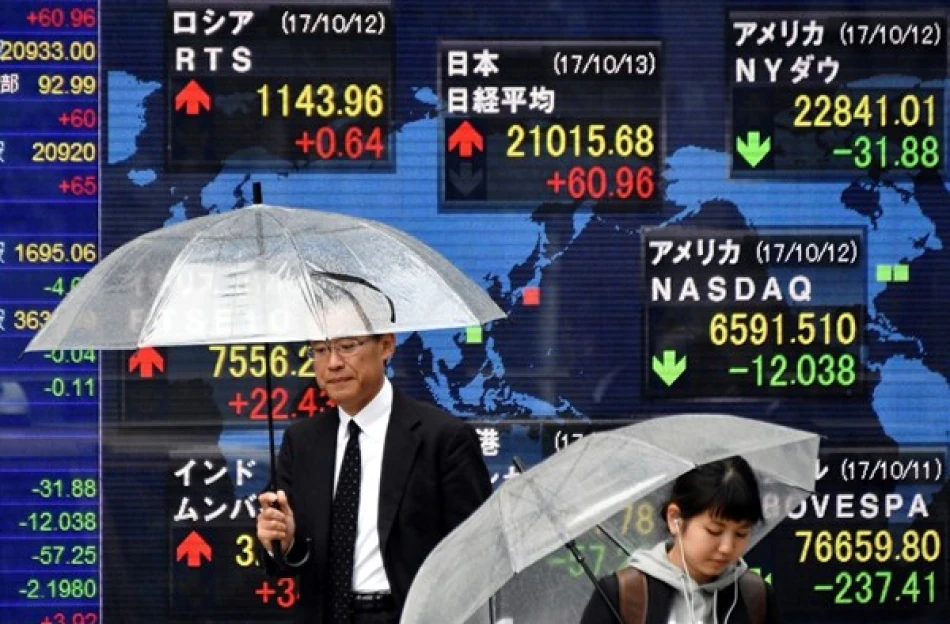
Japanese Nikkei Index Reaches Historic High, Signaling Economic Resurgence
Japan's Nikkei Breaks New Ground as Asia's Bull Run Defies Global Economic Uncertainty
Japan's benchmark Nikkei 225 index surged to a fresh all-time high on Tuesday, extending a remarkable rally that has seen the index climb over 20% this year and finally break free from the shadow of the country's devastating 1989 asset bubble collapse. The milestone reflects Japan's economic transformation and growing investor confidence in corporate reforms, even as global markets grapple with geopolitical tensions and monetary policy uncertainty.
Record-Breaking Performance Signals Structural Shift
The Nikkei 225 jumped 1.6% to reach 42,473.55 points in early trading, surpassing its previous high of 42,426.77 set on July 11, 2024. This latest peak caps an extraordinary year for Japanese equities, which earlier in 2024 finally eclipsed the historic record that had stood untouched since December 1989—the height of Japan's economic bubble.
The broader Topix index has been even more impressive, posting consecutive record highs since July 24, suggesting the rally extends beyond large-cap stocks to encompass Japan's entire equity ecosystem.
Breaking the 35-Year Curse
The significance of surpassing the 1989 peak cannot be overstated. For over three decades, that record served as a painful reminder of Japan's "lost decades"—a period marked by deflation, corporate stagnation, and demographic decline. The fact that Japanese stocks have not only reached but now consistently exceeded those levels signals a fundamental shift in the country's economic trajectory.
Unlike the speculative frenzy of the late 1980s, this rally appears built on more solid foundations: corporate governance reforms, improved profitability, and a weaker yen that has boosted export competitiveness.
What's Driving Japan's Market Renaissance
Corporate Transformation
Japanese companies have undergone significant restructuring over the past decade. The Tokyo Stock Exchange's push for better capital efficiency has forced underperforming companies to improve returns on equity, sell non-core assets, and increase shareholder payouts. This has attracted both domestic and international institutional investors who had long avoided Japanese equities.
Currency Advantage
The yen's weakness against major currencies, particularly the dollar, has provided a substantial tailwind for export-heavy Japanese companies. While this creates inflationary pressure domestically, it has dramatically improved the competitiveness of Japan's manufacturing giants in global markets.
Global Context and Investment Implications
Japan's surge contrasts sharply with the mixed performance of other major markets in 2024. While U.S. indices have been driven largely by artificial intelligence enthusiasm and a handful of mega-cap tech stocks, Japan's rally appears more broad-based and fundamentally driven.
For international investors, Japanese equities now offer exposure to a developed market that trades at reasonable valuations compared to U.S. counterparts, while benefiting from structural reforms and favorable currency dynamics. The performance gap with other Asian markets, including China's struggling indices, has made Japan an attractive alternative for regional exposure.
Risks and Sustainability Questions
Despite the euphoria, several factors could challenge Japan's market momentum. The Bank of Japan's eventual shift toward monetary tightening could strengthen the yen and reduce export competitiveness. Additionally, Japan's aging population and shrinking workforce present long-term structural challenges that financial engineering cannot fully address.
The sustainability of current valuations will ultimately depend on whether Japanese companies can maintain their improved profitability and whether the country can successfully navigate the transition from decades of ultra-loose monetary policy to a more normalized environment.
For now, however, Japan's equity market renaissance represents one of the most significant investment stories of 2024, marking not just a statistical milestone but potentially the end of one of the longest bear markets in modern financial history.
Most Viewed News

 Layla Al Mansoori
Layla Al Mansoori






